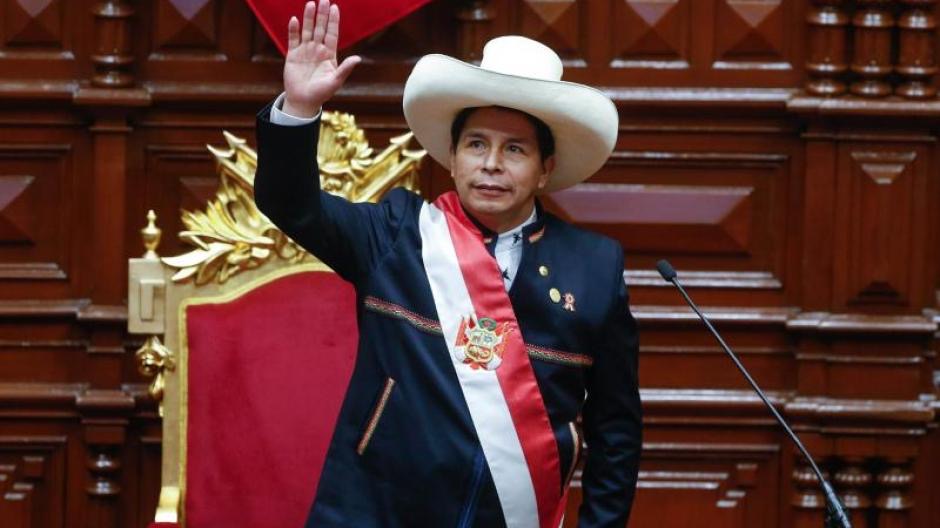Peru’s New President Sworn In, Promises New Constitution
 Pedro Castillo was on Wednesday sworn in as Peru’s fifth president in three years on the 200th anniversary of the country’s independence, promising an end to corruption and a new constitution.
Pedro Castillo was on Wednesday sworn in as Peru’s fifth president in three years on the 200th anniversary of the country’s independence, promising an end to corruption and a new constitution.
The 51-year-old rural schoolteacher, who has vowed to upend a quarter century of neo-liberal government, enters the job with a lengthy to-do list: tame the coronavirus epidemic, reactivate a flagging economy and end years of political turmoil.
“I swear by the people of Peru for a country without corruption and for a new constitution,” he declared before Congress, coming back to a campaign promise to change Peru’s free-market friendly founding law.
The existing charter is a relic of ex-president Alberto Fujimori, serving jail time for corruption and crimes against humanity, and father of Castillo’s main presidential rival, the right-wing populist Keiko Fujimori.
Insisting Peru could not “remain a prisoner” of the 1993 constitution, Castillo said he would send a bill to parliament with a view to organizing a referendum on replacing it.
Castillo’s Free Peru party does not enjoy a majority in a fragmented congress, holding 37 of 130 seats. Fujimori’s Popular Force party has 24.
The new President was declared the victor on July 19 for a five-year term — more than six weeks after a runoff race against Fujimori, whose allegations of voter fraud then had to be reviewed by an electoral jury.
Wednesday’s swearing-in was attended by Spanish King Felipe VI, five Latin American leaders, former Bolivian president Evo Morales and the United States education secretary, among other guests.
Some 10,000 police officers were deployed in the capital Lima, and hundreds of Castillo voters came out waving banners in a show of support.
“This is the first time this country will be governed by a peasant,” Castillo told guests at his inauguration, sporting his trademark, traditional white sombrero and a typical black Andean suit.
He also sought to calm fears among investors, the business community and backers of Fujimori, who had sought to portray him as a communist.
“During the election campaign it was said that we are going to expropriate (assets). It is totally false. We want the economy to have order,” the new president said, adding, however, that he would be looking for a “new deal with private investors.”
Castillo is Peru’s first president in decades with no ties to the country’s political or economic elite.
He has promised reform to ensure there are “no more poor people in a rich country,” but has softened his initial campaign talk of nationalisation.
Castillo is a devout Catholic opposed to gay marriage and abortion.
Peru has been hard hit by the coronavirus epidemic. With nearly 200,000 deaths among its 32 million population, it has the world’s highest reported mortality rate.
An extended pandemic lockdown in 2020 is blamed for the loss of millions of jobs and dumping the country into recession. GDP dropped more than 11 percent.
As his chief economic adviser, Castillo has appointed World Bank economist Pedro Francke, seen as a moderating influence on his boss.
Francke vowed, in a recent interview with AFP, that;
We will not expropriate, we will not nationalize, we will not impose generalized price controls, we will not make any exchange control that prevents you from buying and selling dollars or taking dollars out of the country.
It is widely hoped Castillo will bring an end to years of political upheaval in Peru.
A series of corruption scandals culminated in three different presidents in office in a single week last November.
Seven of the country’s last 10 leaders have either been convicted or are under investigation for graft, and now that she has lost, Fujimori faces an imminent corruption trial for allegedly taking illicit campaign funding for two previous presidential bids.
The election campaign has also been deeply polarizing, with often vehement public support on both sides of the political spectrum for the final two contenders.
“Castillo must rapidly position himself as a president of all Peruvians and not as a president of half of Peruvians,” political analyst Jessica Smith told AFP.
On Monday, Castillo received congratulations in a call with US Secretary of State Antony Blinken who “reinforced our shared commitment to promoting inclusive economic prosperity.”
Castillo, who has vowed to renounce his presidential salary, said Wednesday he would also not govern from the official presidential residence, Pizarro Palace, which he suggested should be turned into a museum.
“I believe we have to break with the colonial symbols,” he said, adding he would return to his schoolteacher’s job at the end of his term.
Three days of ceremonies will culminate in a military parade in Lima on Friday to mark the swearing in.
